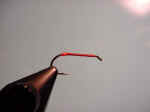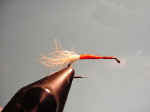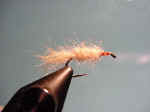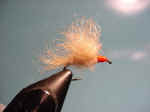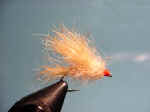|
Fly of the Month Bob Ireton brings together his experience in fly fishing, aquatic entomology, and knowledge of fly tying techniques and materials, to design and tie durable and effective flies. |
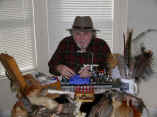
|
![]()
Volume 4, Issue 3
March 2003
![]()
THE USUAL
By Bob Ireton
Photography by Bob Kimsey and Bob Ireton
The 'usual' dry fly is an unusual fly made from unusual
materials; snowshoe rabbit foot hair. It doesn't imitate anything in
particular. However, it is a very buoyant and durable fly. Unless you loose it
to a snag, or a nice fish, you could very well fish with only one fly all day!
And it catches fish! It is labeled as the perfect trout fly, but I think it
will catch any fish that will hit a surface fly!
Francis Betters, who has been a very influential post-war era tyer, developed this fly. His 'haystack', with only minor redesign, became the 'comparadun'. His 'try-it' may have predated the better- known 'elk-hair caddis'.
The 'usual' does have a drawback. The snowshoe rabbit foot hair is a bit difficult to work with. The hair from between the toes is too coarse and twisted to use. But hair from the heel area has a finer, softer texture, and is easier to tye with.
Take your time while tying this fly, and you will be rewarded with a very durable, buoyant fly that catches fish!
MATERIALS
|
Hook: |
TMC 100, Dai-Riki 300, Daiichi 1100, Mustad 94840, Orvis 1509 Size 12-20 |
|
Thread: |
Red or Orange 6/0 for size 12 and larger; 8/0 for size 14 and smaller |
|
Tail/Wing: |
Body fur from the heel of a snowshoe rabbit foot |
TYING STEPS
| 1 - Secure hook properly in vice. Pinch down barb, if desired. Tie in thread one hook-eye space behind eye of hook, and lay on a thread base of close wraps, progressing rearward to point above barb of hook. You want the color of the thread to show through the dubbed body when wet. | |
| 2 - Cut a small clump of fur from the heel area of a snowshoe rabbit's foot, and tie in to make a tail about the length of the hook gape. Half-hitch. Note how much the material compresses; hair from between the toes is much bulkier. | |
| 3 - Using more hair, dub the body forward over the rear two-thirds of the hook shank. Using a dubbing loop would be the best way to dub this type of hair. Half-hitch. | |
| 4 - Select another clump of fur, and tie in a wing that is about the length of the hook shank, and in an arc of about 60°. Half-hitch. | |
| 5 - Continue dubbing to complete body in
front of wing. Form a head of thread, half-hitch, and whip finish. Apply
head cement.
I find that this fly will sometimes lay on its side, so I test my completed fly in a test tank. I have been able to trim the sides of the body till the fly will float in an upright position. |
![]()
Copyright © 1998 - thisyear The Buckeye United Fly Fishers, Inc. Cincinnati, OH 45242
The Buckeye United Fly Fishers, Inc is a non-profit corporation organized under section 501(c)(3) of the Internal Revenue Code, incorporated in the State of Ohio for the preservation, conservation and wise use of our fishing waters and game fish; and to assist in the protection and improvement of our natural resources
